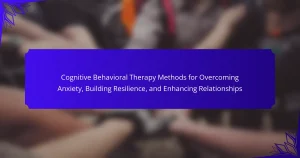Mindfulness techniques can significantly enhance focus, reduce stress, and improve memory. Key practices include focused breathing, body scans, and mindful observation to promote awareness. These methods help decrease anxiety and foster emotional regulation. Regular mindfulness practice has been linked to structural brain changes that support better cognitive function and memory retention.
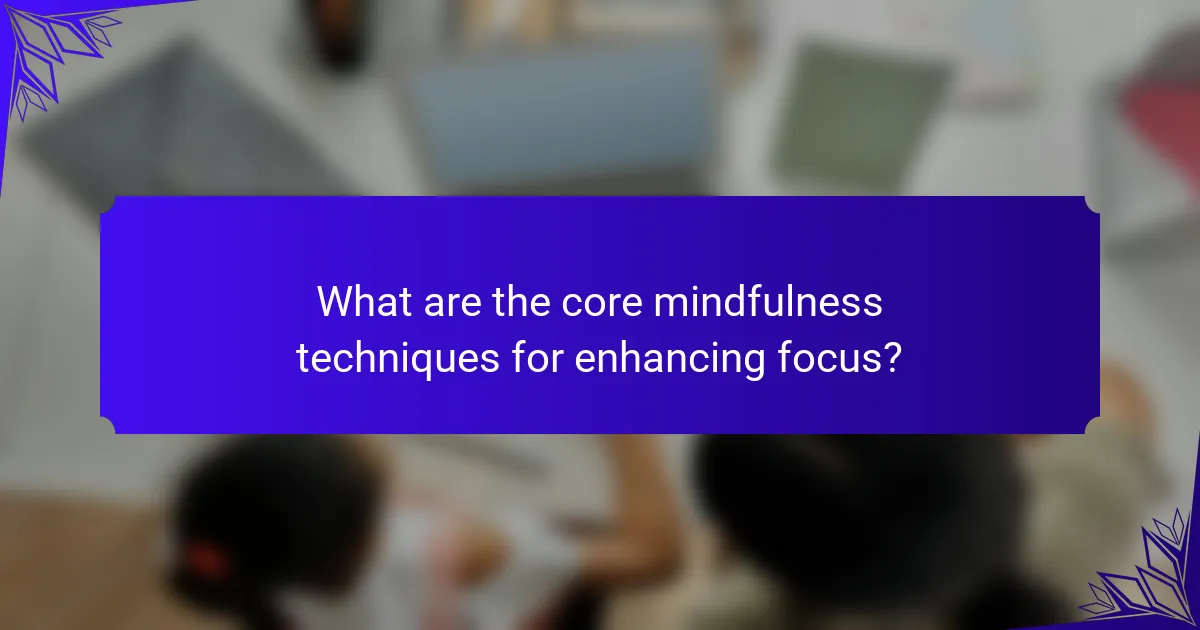
What are the core mindfulness techniques for enhancing focus?
Mindfulness techniques enhance focus through practices that promote awareness and presence. Key techniques include focused breathing, body scan, and mindful observation. Focused breathing involves concentrating on the breath to anchor attention. The body scan encourages awareness of physical sensations, reducing stress and improving concentration. Mindful observation trains the mind to notice details in the environment, fostering a deeper connection to the present moment. These techniques collectively support cognitive function and emotional regulation.
How does mindfulness improve attention span?
Mindfulness techniques significantly enhance attention span by promoting present-moment awareness. Practicing mindfulness reduces distractions and improves cognitive control, allowing individuals to focus better on tasks. Techniques such as meditation, deep breathing, and mindful observation help train the brain to sustain attention longer. Research indicates that regular mindfulness practice can lead to improved information retention and memory performance, making it a valuable tool for enhancing overall cognitive function.
What practices can be used to boost concentration?
Mindfulness techniques can significantly boost concentration through focused practices. Techniques such as meditation, deep breathing, and mindful observation enhance awareness and reduce distractions. Regular practice can lead to improved focus, reduced stress, and better memory retention. Incorporating short mindfulness breaks during tasks can further enhance productivity and clarity.
What role does breathing play in enhancing focus?
Breathing plays a crucial role in enhancing focus by promoting relaxation and increasing oxygen flow to the brain. Mindful breathing techniques, such as deep abdominal breathing, can reduce stress and improve cognitive function. Studies show that controlled breathing can enhance attention span and memory retention, making it an effective mindfulness technique. Regular practice of focused breathing can lead to improved mental clarity and better overall performance in tasks requiring concentration.
What is the impact of mindfulness on cognitive performance?
Mindfulness significantly enhances cognitive performance by improving focus, reducing stress, and boosting memory. Research indicates that mindfulness practices lead to increased attention span and better working memory. For example, a study found that participants who practiced mindfulness meditation showed a 16% improvement in attention tasks compared to a control group. Additionally, mindfulness reduces stress, which can otherwise hinder cognitive functions. This reduction in stress levels allows for clearer thinking and better decision-making. Overall, incorporating mindfulness techniques can lead to substantial cognitive benefits.
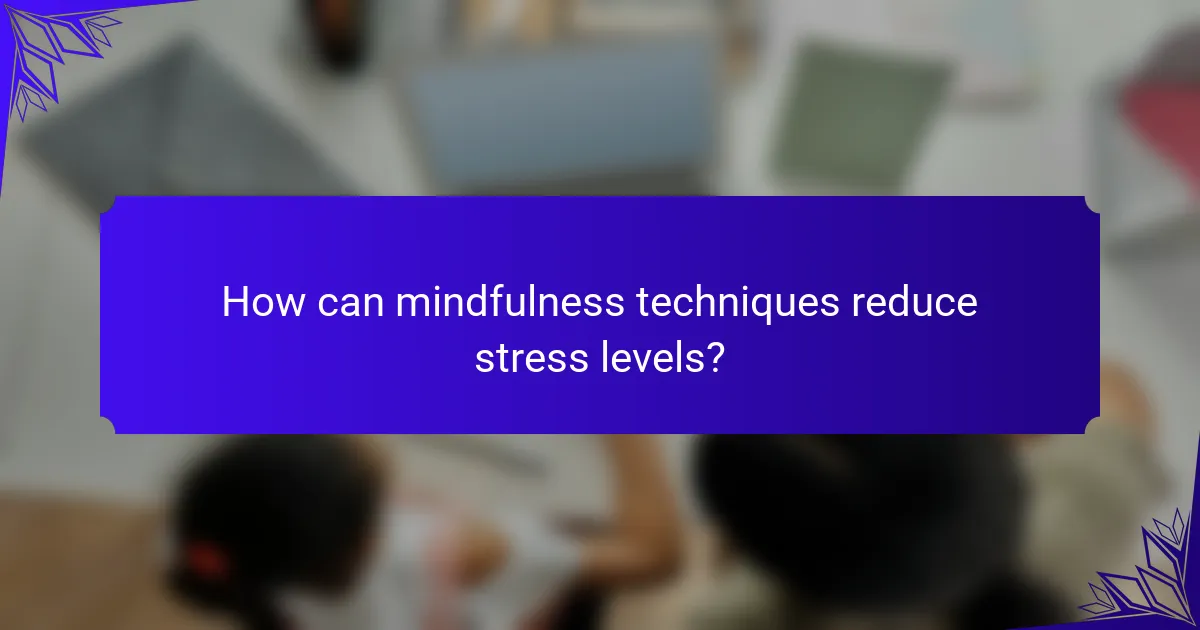
How can mindfulness techniques reduce stress levels?
Mindfulness techniques effectively reduce stress levels by promoting relaxation and enhancing emotional regulation. Techniques such as meditation, deep breathing, and body scanning help individuals focus on the present moment, decreasing rumination and anxiety. Research indicates that regular practice can lower cortisol levels, a key stress hormone. Additionally, mindfulness fosters resilience, allowing individuals to respond more adaptively to stressors.
What are the physiological effects of mindfulness on stress?
Mindfulness techniques significantly reduce stress by promoting relaxation and enhancing emotional regulation. These practices activate the parasympathetic nervous system, leading to decreased heart rate and lower cortisol levels. Research indicates that regular mindfulness meditation can improve focus and working memory, further supporting stress management. Additionally, mindfulness fosters greater self-awareness, allowing individuals to respond to stressors more effectively.
Which mindfulness exercises are most effective for stress relief?
Mindfulness exercises such as deep breathing, body scan, and mindful meditation are effective for stress relief. These techniques promote relaxation and enhance self-awareness.
Deep breathing involves focusing on your breath to calm the mind and body. Body scan encourages awareness of physical sensations, helping to identify areas of tension. Mindful meditation fosters a non-judgmental observation of thoughts, reducing anxiety and stress levels.
Research shows that consistent practice of these techniques can lead to significant improvements in stress management. For instance, a study found that participants who practiced mindfulness reported a 30% reduction in stress levels after eight weeks.
Incorporating these mindfulness exercises into daily routines can enhance overall well-being, leading to a more balanced and focused life.
How does mindfulness promote emotional regulation?
Mindfulness enhances emotional regulation by promoting awareness and acceptance of emotions. It allows individuals to observe their feelings without immediate reaction, fostering a calmer response. Techniques like focused breathing and body scans help reduce stress, improving emotional resilience. Research shows that consistent mindfulness practice can lead to lower anxiety and improved mood stability.
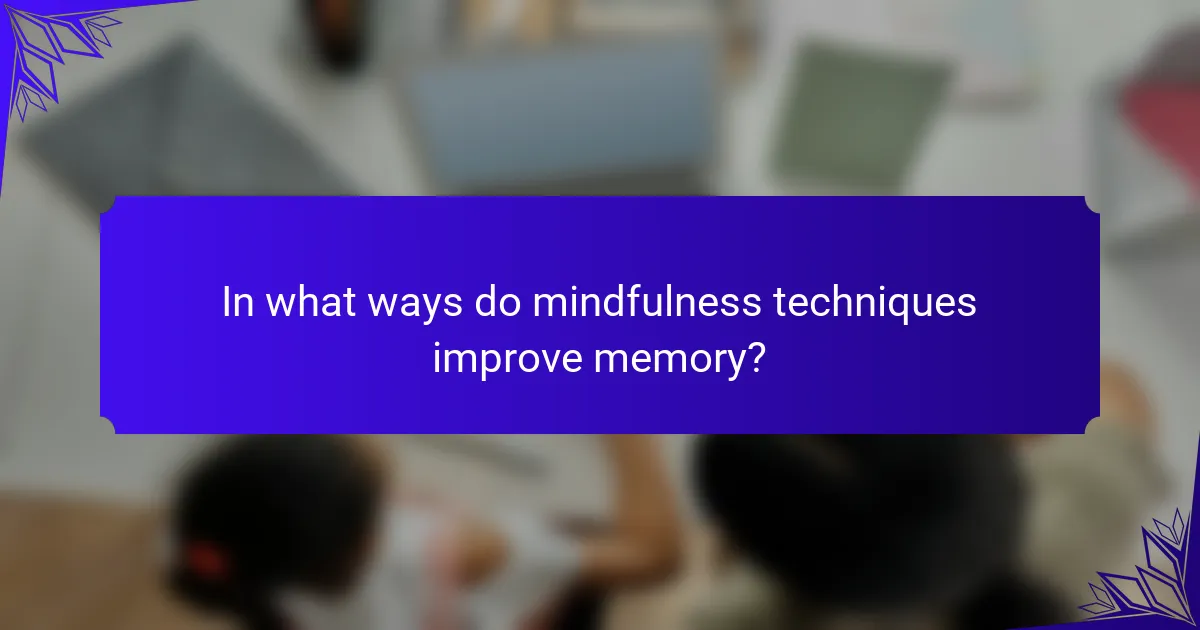
In what ways do mindfulness techniques improve memory?
Mindfulness techniques enhance memory by improving focus and reducing stress. Practices like meditation and deep breathing increase attention span, which aids in better information retention. Research shows that mindfulness can lead to structural changes in the brain, particularly in areas related to memory and cognition. Regular mindfulness practice has been linked to improved working memory capacity, allowing individuals to process and recall information more effectively.
What is the relationship between mindfulness and memory retention?
Mindfulness practices significantly enhance memory retention by improving focus and reducing stress. Techniques such as meditation and mindful breathing create a calm mental state, which facilitates better information processing and recall. Studies indicate that regular mindfulness practice can lead to a 15% improvement in memory performance, highlighting its effectiveness as a cognitive enhancement tool.
How can mindfulness practices enhance recall abilities?
Mindfulness practices can significantly enhance recall abilities by improving focus and reducing stress. Techniques such as meditation and deep breathing exercises promote a state of mental clarity, allowing for better information retention. Research indicates that individuals who engage in regular mindfulness training exhibit improved cognitive functions, including memory recall. Furthermore, mindfulness fosters a unique attribute of heightened awareness, which directly correlates with enhanced memory performance. As a result, incorporating mindfulness into daily routines can lead to noticeable improvements in memory capabilities.
What are the best mindfulness exercises for memory improvement?
Mindfulness exercises can significantly enhance memory by improving focus and reducing stress. Techniques such as focused breathing, body scans, and mindful observation help cultivate awareness and concentration, which are essential for memory retention.
1. Focused Breathing: This technique involves concentrating on your breath, which calms the mind and enhances cognitive function.
2. Body Scan: By mentally scanning the body for tension, this exercise promotes relaxation and sharpens awareness, aiding memory.
3. Mindful Observation: Observing objects or surroundings without judgment helps improve attention and memory by training the brain to focus on details.
Incorporating these mindfulness techniques into daily routines can lead to better memory performance over time.

What unique attributes do mindfulness techniques offer for focus enhancement?
Mindfulness techniques uniquely enhance focus by promoting present-moment awareness, reducing distractions, and improving cognitive flexibility. These practices, such as meditation and breathing exercises, foster mental clarity and resilience against stress, resulting in better concentration. Additionally, mindfulness techniques can strengthen neural pathways associated with attention, leading to sustained focus over time.
How do personalized mindfulness strategies affect focus?
Personalized mindfulness strategies significantly enhance focus by promoting mental clarity and reducing distractions. Techniques such as guided meditation and breath awareness help individuals tailor their practice to specific needs. As a result, users experience improved concentration and reduced stress levels, leading to better cognitive performance. Research indicates that regular mindfulness practice can increase attention span by up to 30%.
What role does environment play in mindfulness effectiveness?
The environment significantly enhances mindfulness effectiveness by providing a calming backdrop that reduces distractions. Natural settings, such as parks or gardens, can lower stress levels and improve focus. Research shows that exposure to nature can lead to a 20% increase in attention span. Additionally, a quiet, organized space fosters a conducive atmosphere for mindfulness practices, allowing for deeper engagement and better memory retention.
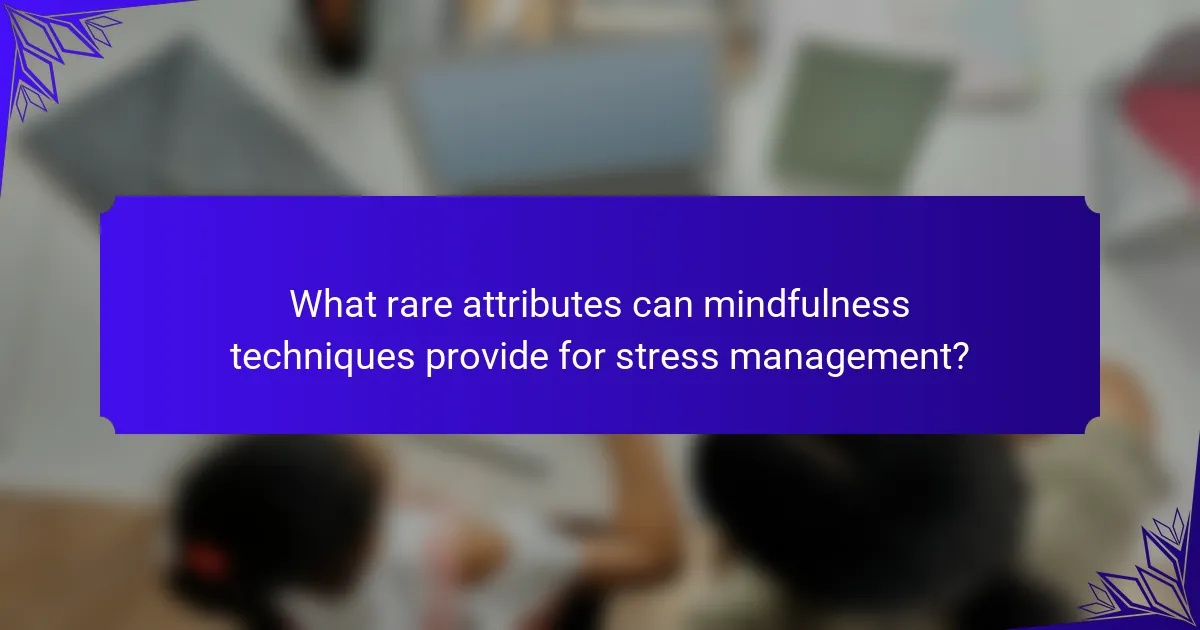
What rare attributes can mindfulness techniques provide for stress management?
Mindfulness techniques can provide rare attributes for stress management, such as enhanced emotional regulation, increased resilience to stressors, and improved cognitive flexibility. These attributes allow individuals to respond to stress with greater calmness and adaptability. Research indicates that mindfulness practices can lead to unique brain changes associated with stress reduction, such as increased gray matter density in areas related to emotional regulation. Additionally, practitioners may experience rare moments of heightened awareness, which can foster deeper connections with their thoughts and feelings, ultimately leading to more effective stress management strategies.
How can unique mindfulness practices cater to specific stress triggers?
Unique mindfulness practices can effectively address specific stress triggers by tailoring techniques to individual needs. For instance, guided imagery can alleviate anxiety related to performance pressure, while breathing exercises may help manage stress from overwhelming responsibilities. Additionally, body scan meditation can target physical tension resulting from prolonged stress. These practices enhance self-awareness, allowing individuals to identify and mitigate their unique stressors. By focusing on specific triggers, mindfulness becomes a personalized tool for stress reduction, improving overall mental well-being.
What innovative approaches exist in mindfulness for stress reduction?
Innovative approaches in mindfulness for stress reduction include techniques like mindful breathing, body scanning, and guided imagery. These methods enhance focus and reduce stress through increased awareness and relaxation. Mindful breathing encourages deep, intentional breaths, which can lower heart rates and promote calmness. Body scanning helps individuals identify areas of tension, allowing for targeted relaxation. Guided imagery uses visualization to create peaceful mental environments, further alleviating stress. These techniques demonstrate unique attributes of mindfulness, offering practical tools for mental well-being.
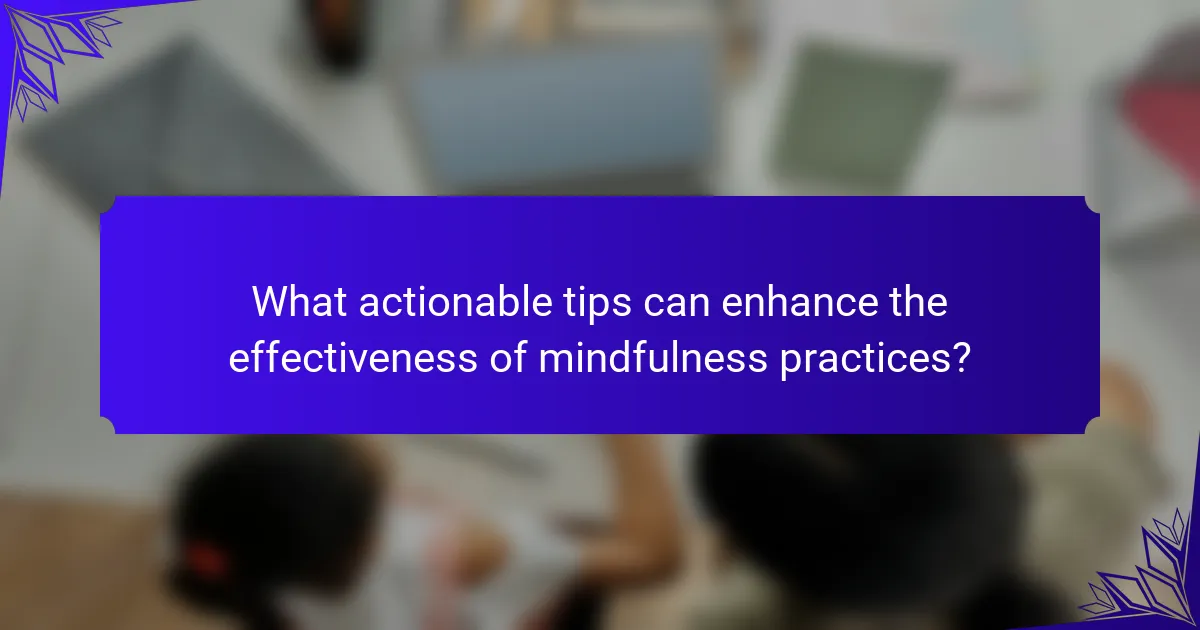
What actionable tips can enhance the effectiveness of mindfulness practices?
To enhance the effectiveness of mindfulness practices, incorporate structured techniques. Focus on deep breathing exercises to ground attention, engage in body scans to increase awareness, and practice gratitude journaling to foster positive thinking. Regularly setting specific times for mindfulness can also improve consistency and reinforce benefits.
What common mistakes should be avoided in mindfulness practice?
To enhance mindfulness practice, avoid common mistakes that hinder focus and stress reduction.
One mistake is multitasking during mindfulness exercises, which can dilute attention. Another is setting unrealistic expectations for immediate results, leading to frustration. Practicing in a noisy environment can also disrupt the experience. Additionally, neglecting to create a consistent routine may reduce the effectiveness of mindfulness techniques. Finally, focusing solely on the outcome instead of the process can detract from the overall benefits.
How can one optimize their mindfulness routine for better results?
To optimize a mindfulness routine for better results, incorporate consistent practice, set specific goals, and vary techniques. Regular practice enhances focus and reduces stress. Establish clear objectives, such as improving memory or emotional regulation. Experiment with different mindfulness techniques, like meditation, breathing exercises, or mindful walking, to discover what resonates best.

